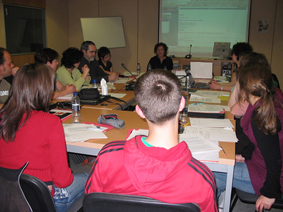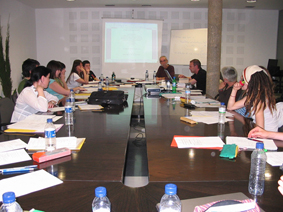Workshop on Basque-Spanish Literary Translation - 2007

This workshop on Basque-Spanish literary translation is the realization of a long-held objective. For many years, all types of translation from and into Spanish have increased considerably. Literary translation is also required and conducted more and more often; nevertheless, due to the lack of practice and training, there are very few translators in the field. Given this situation, we thought it would be worthwhile to develop a workshop on this topic.
The workshop was planned in April of 2007: we asked two translators with considerable experience in translation from Basque into Spanish, Bego Montorio and Gerardo Markuleta, to each teach a session of the workshop, on the translation of narrative and poetry, respectively. We decided that each session should last five hours, and that the workshop would take place in Vitoria, taking advantage of the infrastructure provided by the Translation Studies Department of the University of the Basque Country.
When the course was opened for registration, we realized that we had been right in our assessment of the need for such a workshop; nearly forty people enrolled. Since this was too many people for the workshop to function as it should, we decided to offer the workshop twice. The first took place on the days originally set for it (May 11 and 12), and the second the following month (June 1 and 2).

In both sessions, the teachers demonstrated their mastery, and the students their interest in the topic: the sessions were very lively, and an excellent balance was struck between general interaction and attention to concrete problems. The students had prepared the texts that the teachers had selected in advance and were thus able to examine in detail and from a practical point of view the problems involved in Basque-Spanish translation. Furthermore, information was given on written and web resources, both useful dictionaries and pertinent websites.
The students evaluation upon completing the course was very positive. The particularly praised the preparation and attitude of the teachers, the appropriate give-and-take with respect to the texts, the good organization and the opportunity to become familiar with the chosen genres (especially with poetry). Additionally, they pointed out the importance of such courses, and the need for more of them.
Our own evaluation in EIZIE (Euskal Itzultzaile, Zuzentzaile eta Interpreteen Elkartea, the Association of Translators, Correctors and Interpreters of the Basque Language) also could not have been more positive: we believe that our original goals were met and, if there is sufficient demand, we are willing to organize more such workshops or courses.
The workshop was organized by EIZIE with the assistance of the University of the Basque Country and with the support of CEDRO (Centro Español de Derechos Reprográficos, the Spanish Reproduction Rights Center).



